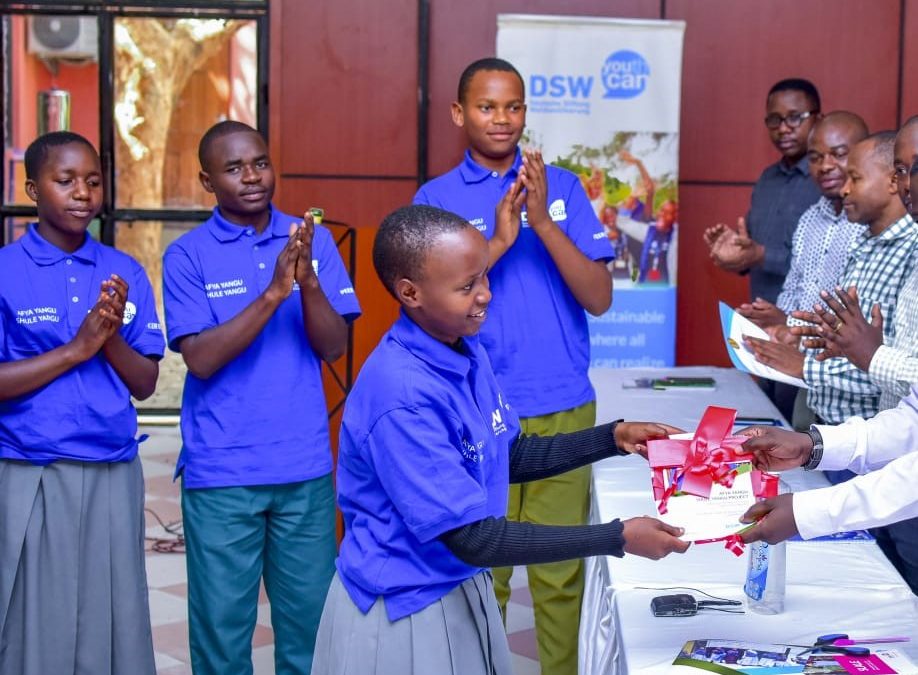DSW Tanzania has been implementing the “Afya yangu-Shule Yangu (My Health My School )” project in Dodoma City. The project recently organised a close out meeting that had the objective of disseminating lessons learnt and best practices to stakeholders after its completion. Findings from the project evaluation results show a remarkable improvement of the in school adolescents specifically in Sexual Reproductive Health and Rights (SRHR) knowledge and their well-being.
The “Afya Yangu-Shule Yangu” project aims at ensuring that adolescents aged 15-19 years in secondary schools in Dodoma City Council have increased SRHR knowledge and access to youth-friendly SRH-services, as a result , contributing to a reduction of teenage pregnancy in Tanzania. Moreover, the project focuses on supporting the Government efforts by following a comprehensive approach that addresses the issues of adolescent health.
The major drivers for adolescent pregnancy in Dodoma region had been documented to include, inadequate information on SRHR, limited access to youth-friendly SRH services, a non-supportive community environment towards adolescents’ SRHR needs, and inadequate translation of existing policies into practice.

Presentation of Project Results
The Afya Yangu Shule Yangu intervention addressed the challenges during implementation and findings shows that DSW Tanzania uses a set of approaches that enabled attainment of positive results in the project that includes Stakeholders Engagement, Peer Education approach, Creating ownership in strengthening school health club, Community Entry Protocol through creating sustainability, Strengthening communications, coordination and capacity (CCC), Community Dialogue and Integration of Sectoral Engagement.
During the lessons learn and best practice workshop, different stakeholders gave their views on the results of the project and recommended its replication to other geographical areas.
Lessons learnt were gathered from key stakeholders insights about the Afya Yangu_ Shule Yangu project. The stakeholders includes in school adolescents, community leader’s parents, teachers, health service providers, LGA officials, Regional Secretariat officials and Central Government officials. They gave their views about the relevance, effectiveness, efficiency, and sustainability of the project. They noted that the project was successful for the well being of the adolescents by stating.

Adolescents presentations at the workshop.
“The project inputs are relevant for the adolescents, both in school and out of school as to prepare them for their adult life” – parents.
“The project has significantly increased the SRHR knowledge among in school adolescents, and had also contributed to increased self-esteem among in school adolescents, and more importantly had contributed to the reduction of early pregnancy” – Government Official, Dodoma City Council.
“The use of school teacher and health service providers to participate in provision of SRHR education to in school adolescents was a very good innovation for reinforcing the message and building trust on the received message among the in school adolescents” – Health Service Provider
“The involvement of all stakeholders, notably Department of Education and Department of Health was a good approach in terms of the project administration and implementation of activities, and the involvement of in school adolescents to participate in discussion about SRHR issues was very innovative” -Government Official, Dodoma City Council.
“The project initiatives of increasing the SRHR knowledge among in school adolescent are expected to continue since DSW Tanzania had laid out the foundation for that through capacity building of the school teachers, health service providers and the adolescent students themselves so we expect them to continue implementing” – Government Official – Dodoma Region Secretariat.

Youth Advocacy and Media Engagement
Overall, the Afya Yangu Shule Yangu project is tested for being scalable for expansion of the innovative approaches by expanding the reach and also the menu of SRHR services that can be provides to adolescents. Key highlights of the evaluation states increased level of awareness on availability of adolescent and youth friendly sexual and reproductive health services; increased access to SRH services to adolescents’ age 15 to 19 year; increased the knowledge on SRHR amongst peer educators; increased the knowledge on SRHR amongst school health club members; contributed to the reduction of incidents of in school pregnancy in the intervention schools and increased uptake of contraceptives among adolescents age 15 to 19 within the communities for out of school youth.
The stakeholders at the workshop reaffirmed continuation of the health promotion initiative of the Afya Yangu Shule Yangu project through the school health clubs and supportive community structures.
